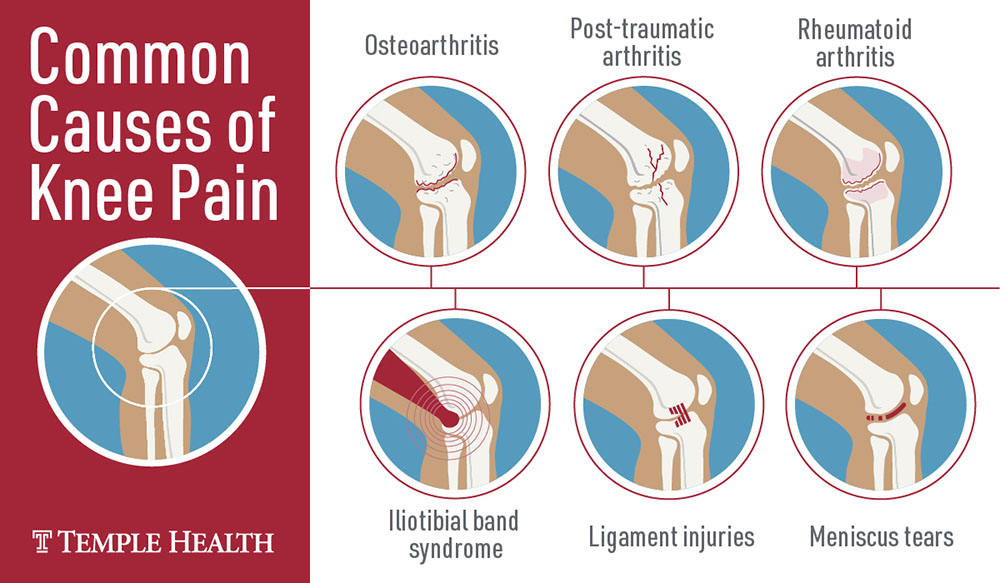Knees are some of the hardest-working joints in our bodies. They take a lot of pounding and pressure every day, so it’s no wonder that knee problems are so common. In fact, I see patients of all ages and fitness levels with knee pain.
Thankfully, you don’t have to live with it. We have many ways to treat knee pain. Talking with an orthopaedic specialist is the first step. With treatment, you can get back to living the life you love.
What causes knee pain?
In my practice, I see many different causes of knee pain. These are some of the most common:
- Iliotibial band syndrome — This inflammatory condition is usually caused by long-term overuse. I often see it in runners’ knees.
- Ligament injuries — Ligaments are the tissues that help hold a joint together. In the knees, the anterior cruciate ligament (ACL) and medial collateral ligament (MCL) are most at risk of tearing.
- Meniscus tears — The meniscus is cartilage that stabilizes the knee. It can be torn if you twist quickly.
- Osteoarthritis — Years of use can cause general wear and tear. Osteoarthritis happens when the cartilage that cushions the bones wears away.
- Patellofemoral pain — This is the most common cause of knee pain in younger adults, resulting from climbing stairs and squatting. The pain is caused by inflammation around the knee cap.
- Post-traumatic arthritis — After a knee injury, you may have bone fractures or ligament tears. Over time, those injuries can damage the cartilage as well.
- Rheumatoid arthritis — With this disease, the membranes around the joints become thickened and inflamed, which can damage the cartilage.
To find out exactly what’s causing a patient’s pain, I usually start with a detailed medical history and a physical exam. I’ll also order some imaging tests to see what’s happening inside the joint.

Can knee pain be treated without surgery?
Yes. It’s a good idea to discuss all of your treatment options with your doctor.
At Temple Orthopaedics & Sports Medicine, we don’t jump right into surgery. Instead, our first choice is often conservative treatment, including:
- Medications, like anti-inflammatory drugs or corticosteroid injections, such as cortisone
- Exercises or physical therapy to improve movement and strength
- Biologic treatments, such as platelet-rich plasma therapy
- Ice for swelling
- Rest
What if surgery is needed?
Sometimes knee surgery is necessary. When that happens, our orthopaedic surgeons are ready to help.
There are several types of knee surgery your doctor might recommend. Two surgeries offered at Temple are arthroscopic surgery and total knee replacement. Each one meets specific needs.
Arthroscopic knee surgery
This minimally invasive procedure involves making small incisions to treat the affected area. Knee arthroscopy can be used to repair the meniscus or the ACL. It can also be used to remove damaged tissue or treat kneecap issues. Because this surgery uses small incisions, patients tend to feel less pain and stiffness.
Total knee replacement
A total knee replacement is more involved, where the worn-out parts of the knee joint are replaced. Metal implants take the place of the existing cartilage and bone, and a plastic spacer creates a smooth gliding surface between them.
If patients have general, severe knee pain that impacts their daily life, I often recommend a consultation with one of our knee replacement specialists. It can also be a good option for chronic stiffness or inflammation.
Find the right treatment for you
Knee pain doesn’t need to stop you from living the life you want. The first step is to talk with a doctor about what’s behind your pain and what your treatment options might be.
If knee pain is causing you trouble, our orthopaedic team is here to help. Call 800-TEMPLE-MED (800-836-7536) or request an appointment today.
Helpful Resources
Looking for more information?
- Knee problems and pain – learn more about symptoms and treatment options
- Common knee injuries runners have
- Knee replacement surgery – what to expect
- Arthroscopic surgery – 5 things to know
- About our Joint Replacement Program
